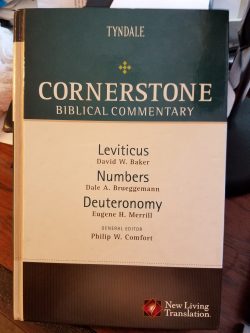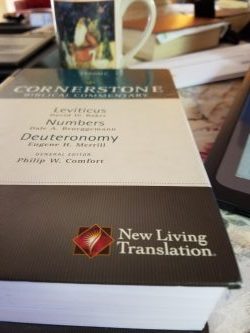Numbers 33 and Matthew 1:1-17
 Regarding Numbers 33 and the 42 stations on the route to the promised land, footnote #1 on page 420, (Cornerstone Biblical Commentary on Numbers), notes that “[p]atristic commentators compared these 42 stations to the 42 (3 x 14) generations in Jesus’ genealogy, but that doesn’t shed any light on ch 33 …”
Regarding Numbers 33 and the 42 stations on the route to the promised land, footnote #1 on page 420, (Cornerstone Biblical Commentary on Numbers), notes that “[p]atristic commentators compared these 42 stations to the 42 (3 x 14) generations in Jesus’ genealogy, but that doesn’t shed any light on ch 33 …”
It is quite true that this comparison sheds no light on chapter 33, but I doubt that there was any intention by the author of Matthew to shed light on Numbers. More likely, if he was making a connection, he was intending to have Numbers 33 shed light on his genealogy. Clearly he went out of his way to get 42 generations and divide them into three groups of 14. It’s very easy to make too much of numerology.
Despite that, I am more and more convinced that New Testament authors quite frequently intended to draw more of the Old Testament narrative into their writing than just what was quoted. One reason for this is that I have noted how the lack of knowledge of the Hebrew Scriptures/Old Testament in modern audiences makes discussing certain passages more difficult. The corollary to this is that a greater knowledge would make discussion easier. New Testament writers could count on greater knowledge among their readers than we can today.
What might Matthew be drawing into the text here? I have argued that Matthew 2:15, when it quotes from Hosea 11:1, “Out of Egypt I have called my son,” is drawing the broader story there into his narrative. At first glance, one might accuse Matthew of taking something that is clearly not Messianic and making a prophecy out of it. Hosea 11 continues with telling us that the more YHWH called his people, the more they went away. My initial reaction to this, and the reaction of many, is that Matthew is grabbing a single clause out of context, and making a prediction of something that isn’t actually a prediction. But I’d suggest instead that Matthew is presenting Jesus as Israel doing it right. When God called Israel at various times, they went away, as Hosea is saying. Jesus, on the other hand, when called out of Egypt or when called to the cross, continues to come.
My suspicion is that the use of 42, besides being the numerologically comfortable grouping of three pairs of sevens (and there are so many ways a set of numbers can be presented!), is intended to point us back to the travels of the Israelites in coming to the promised land. I am in no way suggesting that these 42 stops were in some way predictive, nor am I suggesting that Matthew 1:1-17 gives some sort of new or special meaning to Numbers 33. Rather, I’m suggesting that Matthew uses 42 generations as an allusion to Numbers 33 and to Israel coming out of Egypt and to the promised land.



